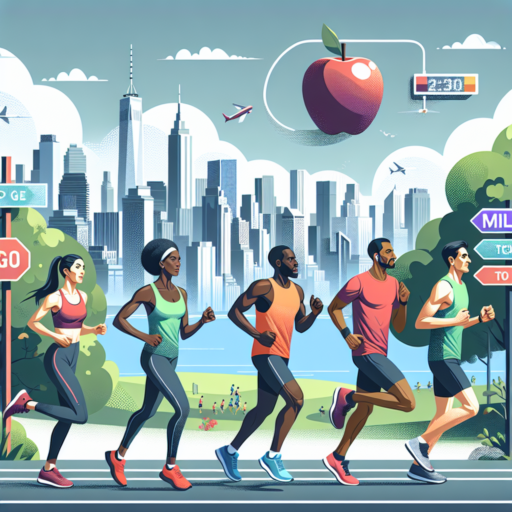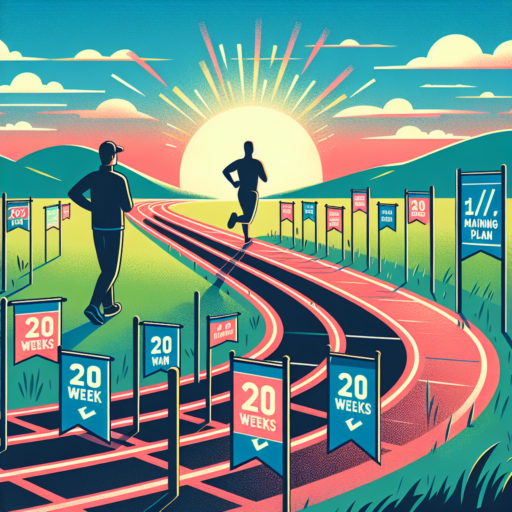How to prep for the NYC Marathon?
Preparing for the NYC Marathon requires a comprehensive plan that encompasses both physical and mental readiness. Firstly, building a solid foundation with a well-structured training plan is essential. Ideally, this means gradually increasing your mileage over several months while incorporating rest days to avoid injury. Understanding your body’s limits and listening to its signals during this period can’t be overstressed.
Creating a Customized Training Schedule
In addition to a progressive increase in mileage, incorporating varying types of runs such as long runs, speed work, and recovery runs into your weekly routine is critical. Tailoring your training to your current level of fitness and marathon goals is also key. Make sure to include strength training and flexibility exercises to support your running and prevent injuries. Using technology or a running coach to help create and refine your plan can offer personalized guidance and accountability.
Nutrition and Hydration Strategies
Nutrition and hydration play a pivotal role in your marathon preparation. Focusing on a balanced diet rich in carbohydrates, proteins, and healthy fats will fuel your long training runs and aid in recovery. Hydration is equally important, particularly during longer runs when electrolyte imbalance can occur. Experimenting with nutrition and hydration during your training will help you find what works best for you on race day.
Remember, preparing for the NYC Marathon is a journey that requires patience, dedication, and perseverance. Each step of your preparation, from creating a personalized training schedule to fine-tuning your nutrition and hydration plan, is a building block towards your goal of crossing the finish line in Central Park. Embrace the process, and let your training milestones fuel your motivation.
How do you qualify to run the NYC Marathon?
Qualifying for the NYC Marathon is a significant milestone for many runners around the world. There are several pathways to secure your spot at the starting line, each with its own set of criteria. Understanding these qualifications is crucial for planning your journey to one of the most iconic marathons.
Time Qualifiers
To qualify through your running time, you must have completed a certified race at a specific pace. The New York Road Runners (NYRR) sets time standards for various age and gender groups. These standards are quite competitive and must have been achieved in the calendar year preceding the marathon you wish to run. It’s essential to check the official NYRR website for the most current qualifying times.
Lottery System
If meeting a specific time standard seems daunting, the lottery system offers another chance. Every year, thousands of hopefuls submit their applications, hoping to be one of the lucky participants selected. The selection process is random, but your chances of getting picked vary each year based on the number of applicants. Remember, entering the lottery requires a non-refundable fee, but if selected, it secures your place in the marathon.
While direct qualification through running times and the lottery are popular options, there are other methods such as charity spots and travel partners that also provide entry into the NYC Marathon. Regardless of the path you choose, securing a spot requires planning, commitment, and in many cases, a bit of luck. The experience of running through the streets of New York, however, is undoubtedly worth the effort.
No se han encontrado productos.
Can anyone enter the NYC Marathon?
Entering the New York City Marathon is a dream for many runners around the globe, but it’s not as simple as just deciding to participate. The event has specific entry requirements that vary depending on several factors, such as residency and running experience. Understanding these requirements is crucial for anyone aiming to be part of this iconic event.
Qualification through Time Trials
One of the primary ways to gain entry into the NYC Marathon is by meeting the qualifying time standards. These times vary by age and gender and are set to ensure that entrants have achieved a certain level of running capability. It’s a straightforward path for seasoned runners, but achieving these times requires serious dedication and training.
Entry via Lottery
For many hopeful participants, the lottery system represents the best chance to enter the NYC Marathon. Each year, thousands of runners from around the world apply for a chance to be selected in this drawing. The lottery is incredibly popular, leading to a highly competitive selection process. While it offers a glimmer of hope for many, it’s important to note that the odds can be slim due to the high volume of applicants.
In conclusion, while the NYC Marathon inspires runners from every corner of the earth to test their limits in the bustling streets of New York, the process to secure a spot at the starting line is not as straightforward as it may initially seem. Potential participants must navigate through the qualification criteria, be it via meeting strict time qualifications, getting selected through the lottery, or exploring other entry methods. Each runner’s journey to the NYC Marathon is unique and demands persistence, patience, and preparation.
How many weeks do I need to train for a marathon?
Training for a marathon is a significant endeavor that requires dedication, discipline, and a well-thought-out plan. The amount of time you need to prepare for this 26.2-mile race largely depends on your current level of fitness, your running background, and your goals for the marathon. For most runners, especially those aiming to complete their first marathon, a training period of 16 to 20 weeks is recommended. This timeline allows your body to adapt gradually to the increasing mileage, reducing the risk of injury.
During your marathon training period, it’s essential to incorporate various types of workouts, including long runs, speed work, recovery runs, and strength training. Starting with a base level of fitness where you can comfortably run for 30 minutes is crucial before embarking on a marathon training program. For those who are already active runners, this base could mean being able to run 15 to 25 miles per week comfortably before starting the specific marathon training.
Moreover, within this training timeframe, runners should not only focus on accumulating miles but also on gradual progression. Increasing your weekly mileage by no more than 10% per week is a good guideline to follow to prevent overuse injuries. It’s also essential to include rest days in your schedule to allow your body to recover and get stronger. Listening to your body throughout the process and adjusting your training plan as needed is vital for a successful marathon preparation.




